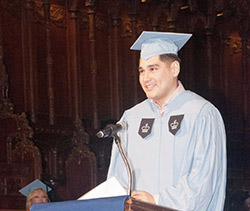Saúl Martinez: Carrying on Chavez's fight through work in a different field
Saúl Martinez: Carrying on Chavez's fight through work in a different field
“When I arrived at TC, I thought I was a lot more culturally competent than I was,” says Saúl Martinez.
After all, Martinez, a California native who graduated in May with two degrees – a Master of Arts and a Master of Education in Psychological Counseling, with a focus on School Counseling, from the Department of Counseling and Clinical Psychology – grew up keenly aware of discrimination and other social justice issues. His grandparents were migrant workers from Mexico. His mother picked grapes. His father was a friend and collaborator of the heroic labor leader Cesar Chavez.
“We had a big connection to the farm workers’ movement and the struggle to represent immigrants who don’t speak the language, who are easy to exploit, who don’t know their rights,” Martinez says. “That was a big part of my identity growing up.”
But his TC experience immeasurably deepened his understanding of himself. “The psychological counseling program allows for deep reflection,” he says. “We’re asked to understand how our identities shape us and our relations with others.”
In a program with mostly female colleagues, Martinez says he found himself challenged to shed the stereotypically tough masculine shell he cultivated after his father died when Martinez was 12. “I felt part of my identity was to be tough, not cry, be the rock for my mother and sisters,” he says. “Being in a program where my rock was challenged, my masculinity redefined, was a beautiful rebirth of myself, something that I value and hope to continue sharing.”
After college at UC Irvine, Martinez worked for a youth development and gang prevention program in Huntington Beach. “It’s known for the beach and fancy houses,” he says of Orange County, “but people need someone to mow the lawns, clean the buildings, do the laundry.” Because those service jobs attract low-wage workers, Martinez said, “there are big pockets of poverty” in Huntington Beach, known as “Surf City, USA.”
Specializing in school counseling at TC was a natural evolution for Martinez from working with working-class, Chicano youth. “They did not feel like they had a place to belong to, even in their own schools where they were supposed to feel safe,” he says. “They were recognized for what they weren’t doing or needed to do better, instead of focusing on their strengths and their qualities.”
In his second year at TC, Martinez put his studies into practice with middle school students in Prep for Prep, a program that prepares students of color for independent and boarding schools, and with high school students at New Heights Academy Charter School, in Washington Heights, in upper Manhattan.
Also while at TC, Martinez served as a graduate assistant at TC’s Institute for Urban and Minority Education, where he was responsible for helping TC students of color mentor minority youth from under-resourced high schools and housing developments in Manhattan.
All this work requires an ability to understand and reach kids who themselves cultivate a tough shell – but who need to understand that toughness can be taken too far.
Martinez was nominated by faculty to deliver the student address his master’s convocation ceremony in May. In that speech, he invoked Sir Isaac Newton, who once said he stood “on the shoulders of giants.”
Martinez believes he must apply that idea by carrying on the work of Chavez, as well as the legacy of his parents and grandparents who struggled to make it possible for him to get an education. At convocation, he challenged his fellow graduates to think along similar lines. “A lot of people struggled for us to get here,” Martinez told his classmates. “We have a responsibility to pay it forward.”
Published Monday, Jun. 10, 2013
